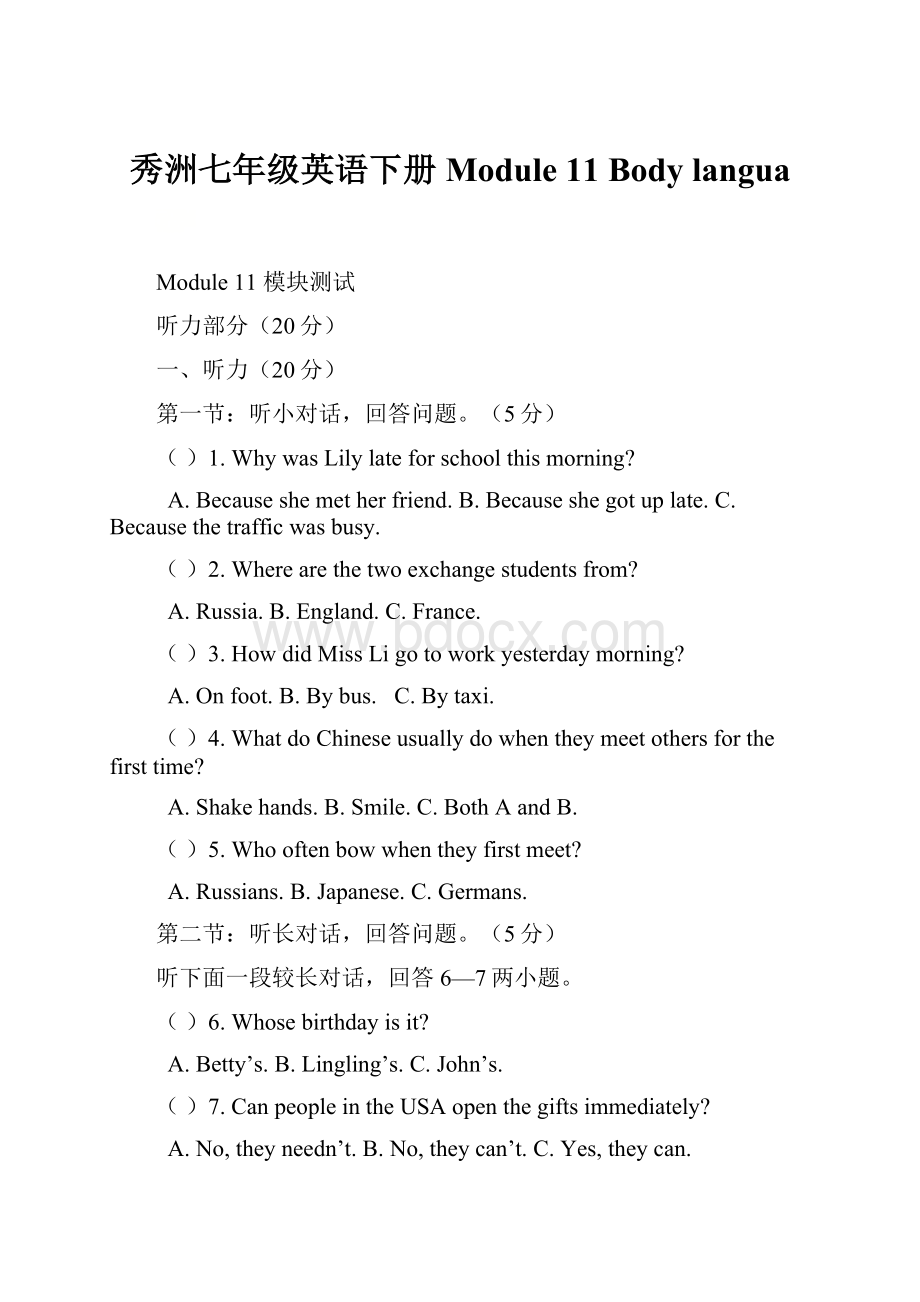秀洲七年级英语下册 Module 11 Body langua.docx
《秀洲七年级英语下册 Module 11 Body langua.docx》由会员分享,可在线阅读,更多相关《秀洲七年级英语下册 Module 11 Body langua.docx(13页珍藏版)》请在冰豆网上搜索。

秀洲七年级英语下册Module11Bodylangua
Module11模块测试
听力部分(20分)
一、听力(20分)
第一节:
听小对话,回答问题。
(5分)
()1.WhywasLilylateforschoolthismorning?
A.Becauseshemetherfriend.B.Becauseshegotuplate.C.Becausethetrafficwasbusy.
()2.Wherearethetwoexchangestudentsfrom?
A.Russia.B.England.C.France.
()3.HowdidMissLigotoworkyesterdaymorning?
A.Onfoot.B.Bybus.C.Bytaxi.
()4.WhatdoChineseusuallydowhentheymeetothersforthefirsttime?
A.Shakehands.B.Smile.C.BothAandB.
()5.Whooftenbowwhentheyfirstmeet?
A.Russians.B.Japanese.C.Germans.
第二节:
听长对话,回答问题。
(5分)
听下面一段较长对话,回答6—7两小题。
()6.Whosebirthdayisit?
A.Betty’s.B.Lingling’s.C.John’s.
()7.CanpeopleintheUSAopenthegiftsimmediately?
A.No,theyneedn’t.B.No,theycan’t.C.Yes,theycan.
听下面一段较长对话,回答8—10三小题。
()8.WhereisTony?
A.InBritain.B.InChina.C.InAustralia.
()9.Whatmustn’tTonydoonSpringFestival?
A.Eatjiaozi.B.Visitfriends.C.Breakanything.
()10.WhatcanTonydoonSpringFestival?
A.SeetheLionDance.B.Cuthishair.C.Dosomecleaning.
第三节:
听独白,回答问题。
(10分)
()11.Whatdoesthepassagetalkab
out?
A.Bodylanguage.B.French.C.Japanese.
()12.Whatdoweoftengiveourfriendwhenheinvitesustohaveapicnic?
A.A“G”.B.A“T”.C.A“V”.
()13.Whatdowelookintowhenwetalkwithothers?
A.Theirfeet.B.Theireyes.C.Theirhair.
()14.Dodifferentbodylanguagesalwaysmeandifferentmea-nings?
A.Yes,theydo.B.No,theydon’t.C.Wedon’tknow.
()15.HowdoFrenchpeoplesayhello?
A.Kiss.B.Bow.C.Shakehands.
笔试部分(80分)
二、完形填空(10分)
Peopleusebodylanguageforsendingmessagestooneanother.Itisvery16becauseitcanhelpyoumakeyourselfeasilyunderstoodwhenyouaretalkingwithothers.Forexample,wavingone’shandistosay“Goodbye”.Shakinghands17welcome.Noddingtheheadmeansagreement,whileshakingtheheadmeansdisagreement.BothChineseandmostforeignersacceptthegestures(示意动作)ashaving18samemeanings.
Differentcountrieshavedifferentbodylanguage.Forexample,19inRussia,FranceandArabcountrieskisseachotherwhentheymeet,butpeopleinChinaorAustraliashakehands20kissing.PeopleinPuertoRicoliketouchingeachother,butpeopleinBritaindonottoucheachother.PeopleinArabcountrieslikestanding21oneanotherwhentheyaretalking,22Englishpeoplemustkeepadistance23whentheyaretalking.
Whenyouuseaforeignlanguage,itisveryimportanttoknowthemeaningsofgesturesintheforeigncountry.Followingthecustoms(习俗)willhelpyoucommunicate24peopleandmakeyoustaytheremuchmore25andmorecomfortable.
()16.A.helpfulB.difficultC.easyD.useless
()17.A.meanB.meansC.tomeanD.meaning
()18.A.aB.anC.theD./
()19.A.menB.manC.womanD.child
()20.A.suchasB.insteadof
C.insteadD.aswell
()21.A.nearlyB.farawayC.closetoD.infrontof
()22.A.andB.orC.howeverD.but
()23.A.fromB.toC.ofD.away
()24.A.withB.forC.toD.through
()25.A.importantB.boringC.pleasantD.successful
三、阅读理解(24分)
A
Bodylanguageisanimportantpartofcommunication.Ifyouwanttocommunicatewell,it’simportanttounderstandhowyoucanuseyourbodylanguagetosaywhatyoumean,especiallywhenyou’reinaforeigncountry.
Ifapersonisbored,hewon’tlookatthepersonwhoistalkingtohim.Hewillfindotherthingstodo.Hemayalsokeeplookingathiswatchoraclock.Ifapersonisopentoyou,hisarmsandlegswillnotbecrossed.Andifapersonisrelaxed,youwillknowitbylookingathisbody,andevenhisbreathingisslower(更缓慢的).
Herearesomeexamplesofbodylanguage.
Bodylanguage
Feelings
Sittingwithlegscrossed
Bored
Sittingwithlegsapart
Open,relaxed
Walkingwithhandsinpocketsandheaddown
Sad
Puttinghandstocheeks
Thinkingaboutsomething
Handsclaspedbehindback
Angry
()26.Whatcanyoudoifyouwanttocommunicatewell?
A.Walkwithhandsinpockets.
B.Usebodylanguagetosaywhatyoumean.
C.Speakinpublic.
D.Saysomethingslowly.
()27.Ifapersonis,hewon’tlookatthepersonwhoistalkingtohim.
A.boredB.excitedC.happyD.open
()28.Ifapersonisrelaxed,.
A.hewillfindotherthingstolookatB.hewillspeakmoreloudly
C.hisbreathwillbeslowerD.hisbreathwillbequicker
B
Agreetingisawayofsaying“Hello”tosomeone.Peopleindifferentcountriesgreeteachotherindifferentways.Herearesome.
WorldGreetings
thePhilippines
Theeverydaygreetingforfriendsisahandshakeforbothmenandwomen.Mensometimespateachotherontheback.
Japan
Whenpeoplemeetforthefirsttime,theyusuallybow.Inbusiness,peoplealsoshakehands.
Informalsituations,peopleoftenexchangebusinesscards.Givethemwithtwohands.Thisispolite.
Specialnote:
InJapan,asmilecanhavedifferentmeanings.Itusuallymeansthatthepersonishappy,orthatthepersonthinkssomethingisfunny.Butitcanalsomeanthatthepersonisembarrassed.
NewZealand
Usually,bothmenandwomenshakehandswhentheymeetsomeoneforthefirsttime.
Funfact:
Ifyouseetwopeoplepressingtheirnosestogether,theyareprobablyMaori.TheMaoriarethenativepeopleofNewZealand.Thisistheirtraditionalgreeting.
Brazil
Menoftenshakehandswhentheymeetforthefirsttime.
Whenwomenmeet,theykisseachotheronthecheek.Womenalsokissmalefriendstosayhello.
Whenyoushakehands,lookatthepersonintheey
es.Thisshowsinterestandfriendliness.
()29.Inwhichcountrydomensometimespateachotherontheback?
A.ThePhilippines.B.Brazil.C.Japan.D.NewZealand.
()30.Inthispassage,whichofthefollowingisNOTmentioned?
A.Kisses.B.Hugs.C.Bows.D.Handshakes.
()31.Ofthefivepicturesabove(a,b,c,dande),whichisthesamewaytogreeteachotherinthefour
countries?
A.aB.bC.cD.d
()32.Whatdoesthewritermainlywanttotellusinthepassage?
A.Differentwaysofgreetings.B.Fourcountries.
C.Somefunfacts.D.Somespecialnotes.
C
Themeaningofshakingone’sheadisnotalwaysthesameindifferentcountries.MaybesomevisitorswouldbesurprisedwhentheyfirstcometoIndia.Indiansalwaysshaketheirheadswhentheytalktoothers.Butitdoesnothavethesamemeaningasour“No”.IfsomeonewantstovisitIndia,heshouldknowthis,oritwillgivehimsometrouble.
Oneday,aforeignofficerwenttoIndiaonbusiness.Hehired(雇用)anIndiantodrivehiscar.Whenhetoldthedrivertosendhimtohisoffice,theIndianshookhisheadatonce.Theofficersaid
again,butthedrivershookhisheadagain.Atlast,theofficer,ofcourse,gotangry.
“Howdare(敢)yourefuse(拒绝)myorder?
”heshouted.“Drivemetomyofficeatonce!
”
Thedriveransweredinaquiteloudvoice,“Yes,sir!
”Buttotheofficer’ssurprise,thedrivershookhisheadatthesametime.
Thecarstarted,andtheforeignofficerwastoosurprisedtosayaword.Hethoughtaboutitforawhile,andthenhenoddedwithasmile.“No”means“Yes”here!
()33.ThepassagemainlytellsusabouttheinIndia.
A.bodylanguageB.clothesC.filmsD.festival
()34.AnIndianwillshakehisheadwhenhe.
A.getsangryB.agreeswithothersC.waitsforothersD.getstired
()35.Theforeignofficerwassurprisedthatthedriver.
A.shookhisheadashesaid“Yes”B.couldn’tunderstandhim
C.refusedhisorderD.shoutedloudly
()36.Theunderlinedsentence“‘No’means‘Yes’here!
”shows.
A.inIndiathewords“Yes”and“No”havethesamemeaning
B.Indiansdon’tsay“No”whentheydisagreewitheachother
C.weshakeourheadstosay“No”whileIndiansdosotomean“Yes”
D.Indiansdon’tusuallyusetheword“Yes”asmuchas“No”
()37.WhichofthefollowingisNOTtrueaccordingtothepassage?
A.Thedriverdidn’twanttotaketheofficertohisoffice.
B.InChinashakingone’sheadmeans“No”.
C.InIndiapeoplesometimesusetheword“Yes”.
D.WhenanIndianshakeshishead,hereallymeans“Yes”.
四、词汇运用(15分)
A)用方框中所给单词的适当形式填空。
shakeholdhugpolitesomewhere
38.It’snottotalkwithyourmouthfull.
39.I’mlookingforwardtogoingtobeautiful,likeParis.
40.Thenursethethermometer(温度计)andputitundermyarm.
41.Shegavehersonaandputhimtobed.
42.Sheisherbookandapen.
B)根据短文内容及汉语提示完成短文。
Hello,everyone!
43(欢迎)toThailand.
I’myour44(导游).BeforegoingtoThailand,youneedtoknowsome45(习俗)there.First,youcan’t46(摸)others’heads.That’s47(因为)it’snot48(礼貌的)atall.Second,don’t49
(指着)atotherswithyour50(手指)whenyoutalktothem.Third,menshouldwear51(衬衫)andshoeswhenvisitingtemples.Fourth,don’tpointatmonkswithyourfingerandwomencan’t52(摇晃)handswiththem.
Followthesecustoms,andyou’llenjoyyourselvesinThailand.
五、语法填空(10分)
阅读下面短文,按照句子结构的语法性和上下文连贯的要求,在空格处填入一个适当的词或使用括号中词语的正确形式填空(每空不多于2个单词)。
Therearemanydifferentcustoms(风俗)inEngland.53weallknow,awoman’sageishersecret.Soyoumustn’taskawoman54sheis.55yougooutonarainydayinEngland,youmayseemanypeopletakingumbrellas.56(not)laughat(嘲笑)them.InEnglandtheweatherchangesvery57(quick).Althoughit’ssunnynow,itmay58(rain)verysoon.Whenyougetapresentfromyourfriend,youmustopenitatonceandsaythankstohim59her.InEnglandandmanyotherWestern60(country),13isn’taluckynumber,61thereisnoRoom13,Class13,Number13andsoon.InEnglandyoumustdriveon62leftoftheroad.Soyousee,youcandosomethinginChina,butyoucan’tdoitinEngland!
Dorememberthesecustomsifyouhavea